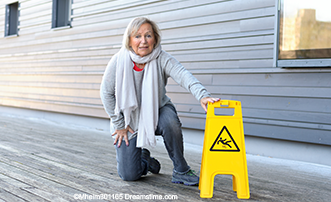Question: I recently had a fall and I am worried about falling again. What steps can I take to remain safe?
Answer: One in four people over the age of 65 fall every year. On average, 32 people per day are seen in our local emergency departments due to falls. Here are some things you can do:
Stay Strong and Speak Up
- Hold on to something sturdy and practice standing on one foot or standing on your tiptoes.
- Use a cane, walker, or other assistive device when walking on uneven surfaces, like a sidewalk.
- Share your concerns with your primary care doctor or a physical therapist who can help with a home exercise program for you.
Review Your Medications
- Talk to your primary care doctor or pharmacist about any medications you are taking. Some medications are known to increase your risk of falling.
Get Your Eyes Checked
- Get your vision checked yearly for any changes.
- Bifocals or trifocals can alter your depth perception and make it easier to lose your balance.
Make Your Home Environment Safer
- Remove throw rugs, cords, furniture, and other tripping hazards from walkways.
- Keep indoor and outdoor pathways well lit.
- Repair loose handrails and torn carpet.
- Store items at waist-level and avoid using step stools.
- Install grab bars where needed.
- Place non-slip material on the shower floor.
- Wear shoes inside and outside for better stability and traction.
- Take your time around small pets as they move quickly and could be a trip hazard.
Contact ADRC at (920) 448-4300 and learn about community Falls Prevention Classes!
Question: I am living in my own home and losing my vision. I want to stay as independent as possible. Is there anyone that can help me with adjusting to my vision loss and assist with possible adaptive equipment?
Answer: The Department of Health Services through the State of Wisconsin has the Office for the Blind and Visually Impaired. They have local offices across the state and they serve all Wisconsin counties and tribes. They can help with adjustment to vision loss, assess for optical aids and lighting, teach you new ways to do daily tasks and how to get around safely in the community, suggest resources, help get you connected to vision loss support groups, and provide information about eye disease and disorders.
If you are a person with vision loss or a family, friend, or caregiver of someone with vision loss, or if you are interested in learning more about vision loss, you can contact their office. The staff can provide one-on-one services for individuals either in the local office or in the individual’s home. They also provide group training and presentations. They do not charge for their services and they can help with any level of vision loss. Call the office at (888) 879-0017. They may have limited services due to the pandemic, call to discuss your situation with them.
You can also find more information on the Department of Health Services website. This site provides links to various resources revolving around vision loss and blindness.




